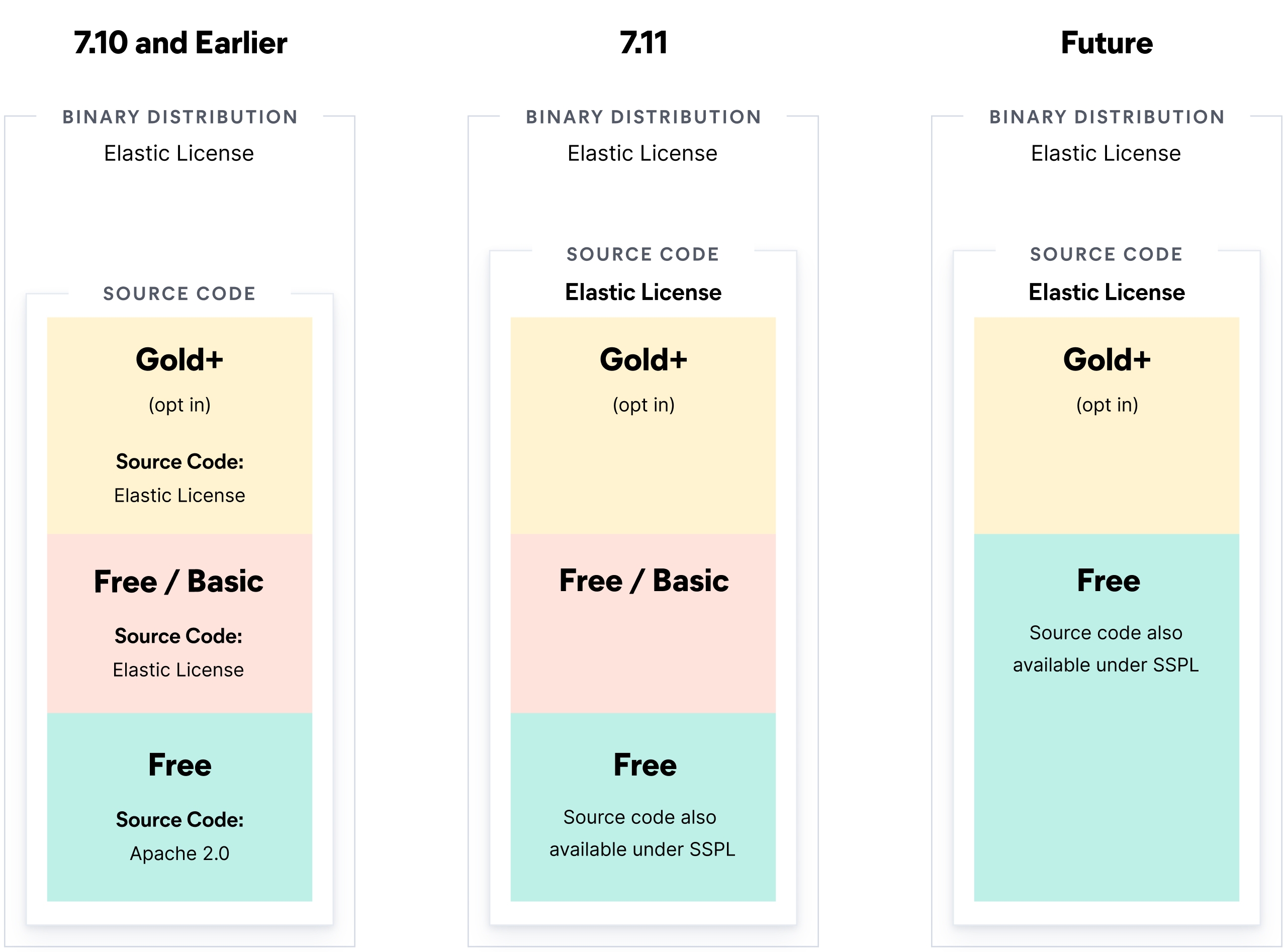Introducing Elastic License v2, simplified and more permissive; SSPL remains an option
When we announced our license change for Elasticsearch and Kibana, moving the Apache 2.0-licensed source code to be dual licensed under both the Elastic License and SSPL, we also mentioned we would work closely with the community on a simplified and more permissive version of the Elastic License. I am happy to share the results with you.
The Elastic License is already widely used. More than 90% of our downloads are under the Elastic License, and those users enjoy the significant additional value provided under the free and open Basic tier. Thanks to this value, the majority of our users and community are already using the software under the Elastic License, so they viewed our recent license change as a non-event. We are happy to see it, because our intent is to minimize any disruption to our community.
We took this opportunity to engage with our community and find ways to further simplify the Elastic License. After talking to users who reached out for clarification, we believe this new version will help to significantly address the majority of your concerns while protecting our products from abuse, misinformation, and confusion.
Elastic License v2
The Elastic License v2 (ELv2) is a very simple, non-copyleft license, allowing for the right to "use, copy, distribute, make available, and prepare derivative works of the software” and has only three high-level limitations. You cannot:
- Provide the products to others as a managed service
- Circumvent the license key functionality or remove/obscure features protected by license keys
- Remove or obscure any licensing, copyright, or other notices
ELv2 applies to all of Elasticsearch and Kibana. It covers the distribution as well as the source code of all free and paid features.
We share our source code for both free and paid features in the spirit of openness. Unfortunately, our copyrights and trademarks have been abused and misused. Our goal with this updated license is to be as permissive as possible while including a minimum set of protections. I hope these protections make sense. See our FAQ for more information about ELv2.
We created ELv2 to hopefully allow others to adopt it. This is the license we wished was available in 2015 when we were a small company facing misinformation. It incorporates all of our learnings from our experience and others who have made similar changes (MongoDB, CockroachDB, RedisLabs, TimescaleDB, Graylog, etc.). Hopefully we helped a little here. There are many companies out there facing a similar decision. I hope that over time, those of us with similar goals can coalesce around a smaller number of licenses and that ELv2 will be a catalyst for that.
In that spirit, we worked on ELv2 with Heather Meeker, a lawyer who is well known for helping to draft many OSS licenses, including the Mozilla Public License 2.0, as well as helping a number of organizations build similar-in-spirit licenses like the Confluent Community License, SSPL, and others. We are also reaching out to initiatives like the Polyform Project and Fair-code as additional efforts to raise awareness of this license and look for ways to promote its wider use.
SSPL remains an option for the source code
We added SSPL, which is a copyleft license created by MongoDB, as an option to minimize the effect this license change would have on our users. MongoDB is one of the most popular projects out there, used by millions of developers who are happy with SSPL.
Since we made this announcement, we had many of our users reach out and say that they are thankful we provided this option. Their organizations are already using MongoDB, and this made our license change a non-event for them.
The SSPL is a licensing option for the source code, as shown below:

And to be clear, we are still not claiming that either SSPL or the Elastic License are OSI-approved licenses.
Still no impact to our cloud and on-premises customers
It is important to repeat: there is no impact to any of our Elastic Cloud or self-managed customers. Our customers already use the default distribution under the Elastic License, and their use is governed by the terms of their subscription agreement, which continues to grant them access to additional features, access to support, and other Elastic commitments (for example, IP infringement indemnification) as before.
The path forward
These changes, including making the Elastic License more permissive, are intended to help us focus on building great products and investing in our community. This means building more great features, many of which we will provide for free and which will be developed in the open. But our commitment goes beyond the code. These license changes let us focus on what matters: helping you find success with our products.